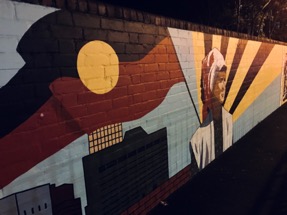Summer Archives
Srivarun TummarakotaSydney, Australia - Show Me The Way |
This summer I was afforded the opportunity to spend my time serving Aboriginal and Torres Strait Islander youth throughout Australia. As the original inhabitants of Australia and the world’s oldest living civilization, Aboriginal people, culture, and traditions are vested in their ability to live with each other and their land – an ability that was taken from them when Captain Cook landed his ship upon shore in 1770.
In the nearly 300 years that have eclipsed, Aboriginal people were murdered, enslaved, dehumanized, neglected, and all in the name of creating a homogenous Australia. However, it is through the stories that Show Me The Way, the non-profit I worked with, captures through film that I was able to fully understand the continual effects of colonization.
Stories like Auntie Joy who took us to the mission where she grew up, a conglomeration of tin shacks on the outskirts of white towns, designed to keep Aboriginal people segregated, but still in the vicinity to keep an eye on. Stories like Leon who described how his father being removed from his home as part of the Stolen Generation led him to grow up in an emotionally distant household. Or stories like Tia, one of the young girls I worked with through the filming process, who talked about crime and teenage pregnancy as realities of her community. Buzzwords like intergenerational trauma, systemic racism, and cultural sensitivity took on new meanings for me as I immersed myself within the Aboriginal community through service, performance, and activism.
It is through this immersion that I also gained insight into how to reverse the effects of history. I met with politicians, NGO employees, grassroots activists, and community members all helping me piece together the puzzle of how to address an issue as systemic as racism. And it is in this vein of discovery that I found myself working for another non-profit, JustReinvestNSW, which helps communities build their own justice reinvestment programs and improve criminal justice outcomes. I can’t say that I have all the answers, but I learned a few key lessons about ensuring community governance, governmental resource building, and utilizing a holistic whole-community approach to solving issues.
As for my project, it culminated in producing a guide for Show Me The Way based on my observations, data collection, and conversations. It entails a large section devoted to student experiences in the program that I collected through a designed evaluation, sections about how facilitators can better engage students, different tactics for future distribution, and a detailed section on long-term sustainability strategies. In addition, I picked up a few side-projects on the side including creating pamphlets on how governmental resources can be repurposed for youth engagement and a toolkit for educators to use in moving away from a suspension/expulsion framework.
“If you have come here to help me, you are wasting your time. But if you have come because your liberation is bound up with mine, then let us work together.” – Aboriginal Activist Lilla Watson

